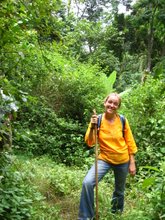Not long after returning to Dar, a student boycott of classes started, causing the government to ask all UDSM undergraduates to leave campus without taking their final exams. I can still hear the uproar on campus, the singing of protest songs, and the marching of their feet down paths. I can still the sticks held by some more radical students who guarded classes to make sure other students weren’t breaking the strike. By May 4, students are supposed to submit a letter requesting re-entrance, so they can take their final exams starting May 14. Campus is empty, only foreign students left, hanging out in empty dorms. We ramble around campus and run into a few acquaintances from time to time.
A traveller without observation is a bird without wings. - Moslih Eddin Saadi
Friday, April 27, 2007
Maasailand, beef and boycotts
Even though it's not spring here (no, it’s the rainy season), for spring break the student groupo here headed to the north of Tanzania—on the border of Kenya – on a cultural field trip after our classes ended. We feared our trip would suffer from the weather, but the rain started late—bad for crops but good for us. It’s daunting to describe all our experiences (and this might explain why it’s taken me so long to blog about it); it all went so fast and we learned so much—with each day we spent time with a new ethnic group: the Pare, the Chagga and the Masai. Tanzania is unique from its neighbors because the country has more than 120 ethnic groups. In a Maasai traditional village or boma at the foot of sacred Mount Longido , we listened to a storyteller-guide tell us about Maasai life. The pastoral Maasai, it is said, are one of the only groups who stick to tradition in spite of the pressure to modernize. Even those Maasai who seem to have abandoned their ways, hawking beautiful bead jewelry in Dar markets, lead their cows to graze across highways dressed in the Shuka. We stepped inside one of their dwellings to hear how men are the community leaders, often leaving the village for days at a time to take care of cattle. Women are responsible for house construction and maintenance. We saw few adult men around, and so concluded that they were often absent, in the fields. Usually, tours include a taste of Maasai beef bought in the market, but Rift Valley Fever—transmitted through eating uncooked beef, put a kibosh on that. This disease hasn’t been to traumatic, but it gave us the opportunity to praise vegetarianism to our students!
Subscribe to:
Post Comments (Atom)
La Cigale en voyage

In Tanzania
No comments:
Post a Comment